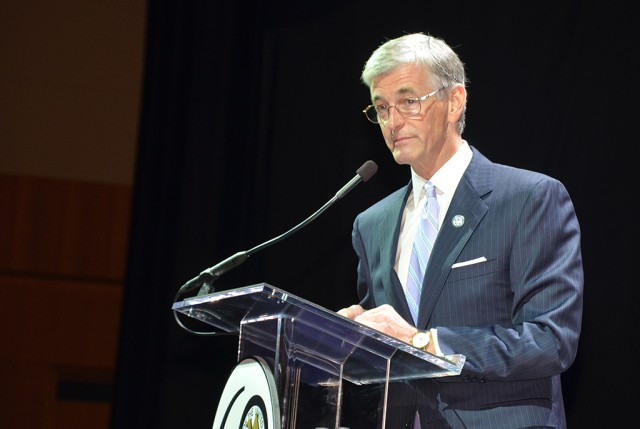WASHINGTON, D.C. -- More than 33,000 Soldiers, Army civilians and contractors are expected to gather over the next three days to attend the 2010 Association of the United States Army annual meeting here.
Secretary of the Army John McHugh addressed the opening ceremony Oct. 25 at the Washington Convention Center. He explained how he has spent his first year as the Army's civilian leader learning the challenges the Army faces and exploring opportunities for change. McHugh used the venue to hint at major changes coming soon.
"I felt the need to begin a process of finding how our Army can do things smaller, smarter, cheaper and better," he said.
The secretary directed senior Army leaders to spearhead what he called "Capability Portfolio Reviews."
"They already show great promise in bringing better discipline in our programs," McHugh said. "They give us a better way to evaluate and realign our requirements."
By February, McHugh expects this process to provide an "overarching and detailed analysis." Earlier this year he commissioned a review of Army acquisition processes and stood up a short-term task force to analyze costs and establish credible benchmarks.
"This will help us to better understand not only where our money goes, but what we're getting in return for it," he said. "We'll ensure responsible and necessary departmental priorities for investment, research and development and acquisition, to include force structure and training across every one of those portfolios."
The secretary said the institutional Army must be an engine of change, and also be designed to change.
"Efficiencies are not simply about improving the bottom line, they're about doing things better, doing them smarter and taking full advantage of the progress technology, knowledge and experience that we have available to us, and in this Army those are almost an unlimited resource," he said.
McHugh said the transformation would begin with leaders who recognize the need for change, understand it and welcome it.
"I hope this effort will lead to a better Army, and will lead to our serving those great men and women even more effectively," he said. "We have a solemn responsibility to build morale while ensuring our troops in the field have the best training, equipment and leadership, that their families have care, support back home, that we take care of our wounded and fallen in a manner befitting their service and sacrifice, and that we as an organization are as efficient and adaptable as that American Soldier."
McHugh said there have been past Army transformation efforts.
"I want to be very clear. Struggling to bring fiscal discipline to military institutions has been tried before -- you might not be surprised to hear," he said. "The Army has seen significant structural changes. For example, [General] Marshall's reorganization of the War Department in 1942 and Operation Steadfast following the end of the Vietnam War, which realigned our institutions and built an all-volunteer force."
In 1973, the Army reorganized by disestablishing the Continental Army Command and the Combat Developments Command. Two new commands were created the transformation, the Training and Doctrine Command and Forces Command.
The secretary said institutions have an historical tendency to evolve slowly, if at all.
"In, and of itself, [the Army must be] an entity driven by ideas, innovation and determination to bring the best services, equipment and leaders to our Servicemembers and their families," he said.
Today's Army uses a structure designed generations ago, he said.
"The institutional Army, what we call the generating force, which prepares, trains, educates and supports our forces for the current and future fights, looks pretty much the same as it did structurally since the early the mid-1970s," he said. "In fact, as we look at what has happened over the past nine years in Afghanistan and Iraq, we can understand that generating force has performed magnificently, even while burdened with an outdated construct."
Over the course of the past nine years, the operational Army has changed dramatically, the secretary explained.
"The need for that change has been driven by a fundamental reality: contact with a decentralized, adaptive, creative and very, very deadly enemy," he said.
"Let's not make any mistake about it, at least in my opinion, motivation is soon to come and it's going to come in the form of a harsh reality," McHugh said. "We're going to make sacrifices and change the way we do business. It won't be easy, but you know what' It's okay. In fact it's more than okay. It's a good thing."
McHugh said a task force has been hard at work and will provide a full report within 90 days.
"I think we're on the right track," he said. "This will ensure a quality all-volunteer force like we have built today continues into the future regardless of budget issues."
In the months ahead, McHugh said he wants to talk to and listen to Soldiers, Army civilians and leaders.
"We're looking for ways to change and to innovate and to do a better job for the taxpayer, but most importantly for our Soldiers, and our Army Family Members," he said. "I know it won't be easy. I know it's been tried before."
The secretary's goal is to create a new foundation for the Army, seek innovative approaches to problems old and new and re-look and re-think everything the Army does and puts into motion.
"Why do I bring this all up' Simply, I need your help. I want your leadership. I want your partnership in helping to make this Army, our Army, better," he said. "I recall Bob Dylan once saying you don't have to be a weatherman to know which way the wind is blowing, and the times they are a 'changing."


Social Sharing